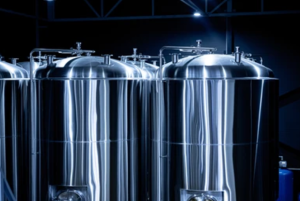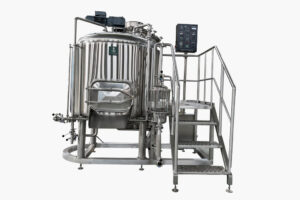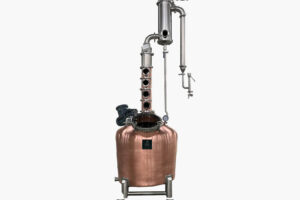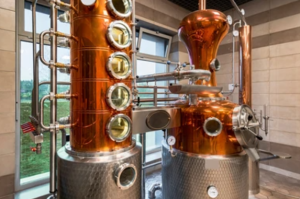COPYRIGHT © 2022 NingBo COFF Machinery Co., ltd. ALL RIGHTS RESERVED
Menu
Categories

Maintaining your alcohol distiller machine is crucial for ensuring its safety and efficiency. Regular upkeep not only minimizes downtime but also extends the machine’s lifespan, allowing you to enjoy consistent, high-quality output. By dedicating time to routine maintenance, you safeguard your investment and optimize performance. This proactive approach helps prevent potential issues, ensuring that your distillation process remains smooth and effective. Remember, a well-maintained machine is key to achieving the best results in your distillation endeavors.
Key Takeaways
- Regular maintenance of your alcohol distiller machine is essential for safety and efficiency, helping to extend its lifespan and improve output quality.
- Always prioritize safety by ensuring proper ventilation, checking for leaks, and maintaining electrical safety to prevent accidents during distillation.
- Choose high-quality materials like stainless steel or copper for your distillation equipment to ensure purity and durability in your spirits.
- Establish a routine for inspections and cleaning to identify potential issues early and maintain hygiene, which is crucial for product quality.
- Monitor key parameters such as temperature and pressure during the distillation process to achieve consistent, high-quality results.
- Stay informed about the latest distillation techniques and best practices through continuous education and participation in industry events.
- Develop an emergency preparedness plan to handle unexpected situations effectively, ensuring a safe distillation environment.
Safety Precautions for Your Alcohol Distiller Machine
Ensuring safety while using your alcohol distiller machine is paramount. By following essential safety precautions, you can prevent accidents and maintain a secure environment.
Fire Safety
Fire safety is crucial when operating an alcohol distiller machine. Alcohol vapors are highly flammable, so you must take steps to prevent ignition. Keep any open flames or heat sources away from the distillation area. Ensure that you have a fire extinguisher nearby and know how to use it. Regularly check for leaks in the equipment, as even a small leak can lead to a dangerous situation.
Ventilation
Proper ventilation is vital for safe distillation. You should place your distiller in a well-ventilated area to prevent the buildup of harmful vapors. Good airflow helps disperse any fumes, reducing the risk of inhalation or explosion. Consider installing exhaust fans or opening windows to enhance ventilation. This practice not only ensures safety but also improves the efficiency of your distillation process.
Electrical Safety
Electrical safety is another critical aspect to consider. Ensure that all electrical components of your alcohol distiller machine are in good condition. Inspect cords and plugs for any signs of wear or damage. Use outlets with ground fault circuit interrupters (GFCIs) to prevent electrical shocks. Avoid overloading circuits and keep electrical connections dry and away from any liquid spills. By taking these precautions, you can minimize the risk of electrical hazards.
Proper Equipment and Setup for Alcohol Distillation
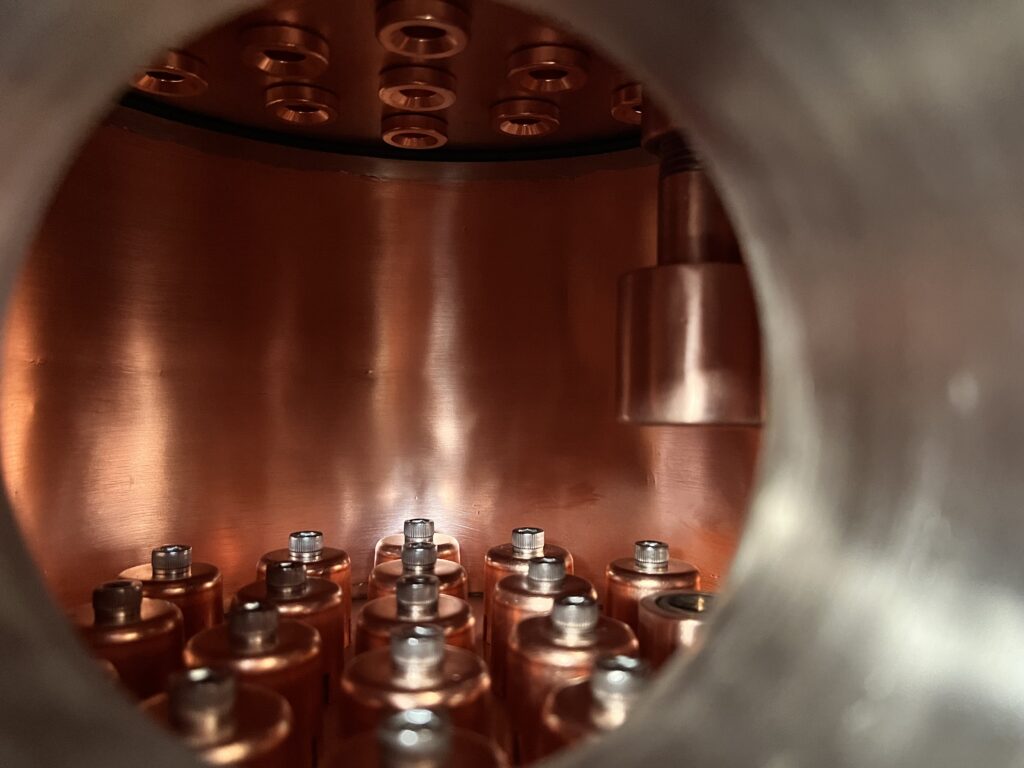
Selecting the right equipment and setting it up correctly are crucial steps in ensuring a successful distillation process. By focusing on these aspects, you can enhance the efficiency and safety of your alcohol distiller machine.
Choosing the Right Materials
When it comes to distillation, the materials you choose play a significant role in the quality and safety of your spirits. Opt for equipment made from stainless steel or copper. These materials are not only durable but also resistant to corrosion. They do not react with alcohol, ensuring that your distillate remains pure and uncontaminated. Avoid using equipment made from inferior materials, as they can compromise the quality of your output and pose safety risks.
Setup Best Practices
Setting up your distillation equipment properly is essential for optimal performance. Follow these best practices to ensure a smooth and efficient distillation process:
- Stable Surface: Place your distiller on a stable, level surface to prevent any accidental tipping or spills.
- Ventilation: Ensure that the area is well-ventilated to disperse any fumes and maintain a safe environment.
- Secure Connections: Check all connections and seals to prevent leaks, which can lead to safety hazards and loss of product.
- Temperature Control: Use a reliable thermometer to monitor the temperature closely, as precise control is crucial for effective distillation.
- Regular Inspection: Before each use, inspect your equipment for any signs of wear or damage. Address any issues promptly to avoid disruptions during the distillation process.
By adhering to these guidelines, you can set up your alcohol distiller machine for success, ensuring both safety and efficiency in your distillation endeavors.
Regular Maintenance of Your Alcohol Distiller Machine
Regular maintenance of your alcohol distiller machine is essential to ensure its longevity and optimal performance. By establishing a consistent routine, you can prevent potential issues and maintain the quality of your distillation process.
Inspection Routines
Conducting regular inspections is a fundamental part of maintaining your alcohol distiller machine. You should develop a checklist to guide your inspection process. Here are some key areas to focus on:
- Visual Inspection: Look for any visible signs of wear or damage. Check for cracks, leaks, or corrosion on the surface of the equipment.
- Component Check: Examine all moving parts and connections. Ensure that seals and gaskets are intact and functioning properly.
- Electrical Components: Inspect cords, plugs, and switches for any signs of wear or damage. Make sure all electrical connections are secure and free from moisture.
- Safety Features: Verify that all safety features, such as pressure relief valves and temperature controls, are operational.
By performing these inspections regularly, you can identify and address issues before they escalate, ensuring the safe and efficient operation of your machine.
Cleaning Practices
Cleaning your alcohol distiller machine is crucial for maintaining product quality and extending the equipment’s service life. Here are some effective cleaning practices:
- Initial Cleaning: Before using your distiller for the first time, clean it thoroughly with hot, soapy water to remove any manufacturing residues.
- Post-Use Cleaning: After each use, rinse the distiller with warm water to remove any remaining residues. This prevents contamination and maintains hygiene.
- Deep Cleaning: Periodically, use a mild cleaning solution like PBW (Powdered Brewery Wash) followed by a citric acid rinse to achieve a shiny finish and remove stubborn deposits.
- Copper Mesh Maintenance: Clean the copper mesh regularly, as its cleanliness directly affects its ability to remove sulfur compounds from the liquor. This impacts the overall quality of your distillate.
By adhering to these cleaning practices, you can ensure that your alcohol distiller machine remains in top condition, providing you with high-quality output every time.
Monitoring the Distillation Process

Monitoring the distillation process is crucial for achieving high-quality results. By keeping a close eye on key parameters, you can ensure that your alcohol distiller machine operates efficiently and safely.
Temperature Control
Temperature control plays a vital role in the distillation process. You must maintain precise temperatures to separate alcohol from other components effectively. Use a reliable thermometer to monitor the temperature throughout the process. Aim to keep the temperature steady, as fluctuations can affect the quality of your distillate. Adjust the heat source as needed to maintain the desired temperature range. By doing so, you ensure that the alcohol vaporizes at the correct rate, leading to a purer product.
Pressure Control
Pressure control is another essential aspect of distillation. Excessive pressure can lead to equipment failure or safety hazards. Regularly check the pressure gauge to ensure it remains within safe limits. If you notice any unusual pressure changes, investigate immediately to identify the cause. Make sure all valves and seals are functioning correctly to prevent pressure buildup. By maintaining proper pressure control, you safeguard your equipment and produce a consistent, high-quality distillate.
Continuous Education and Planning
Staying informed and prepared is essential for anyone involved in alcohol distillation. By continuously educating yourself and planning for emergencies, you can enhance your skills and ensure a safe distillation environment.
Staying Updated with Techniques
To excel in distillation, you must stay updated with the latest techniques and industry trends. Engaging with experts and participating in events like the Distillation Experts Conclave can provide valuable insights. This gathering brings together professionals from various sectors to discuss challenges and share experiences. By attending such events, you gain access to cutting-edge methods and innovative solutions.
- Read Industry Publications: Subscribe to journals and magazines that focus on distillation. These resources often feature articles on new technologies and best practices.
- Join Online Forums: Participate in online communities where distillers exchange knowledge and advice. These platforms offer a wealth of information and support.
- Take Courses: Enroll in workshops or online courses to deepen your understanding of distillation processes. Continuous learning helps you refine your skills and improve your output.
Emergency Preparedness
Being prepared for emergencies is crucial in any distillation setup. You need to have a plan in place to handle unexpected situations effectively.
- Develop an Emergency Plan: Create a detailed plan outlining steps to take in case of fire, equipment failure, or chemical spills. Ensure everyone involved in the distillation process is familiar with this plan.
- Conduct Regular Drills: Practice emergency procedures regularly to ensure readiness. Drills help identify weaknesses in your plan and improve response times.
- Maintain Safety Equipment: Keep fire extinguishers, first aid kits, and protective gear readily available. Regularly check these items to ensure they are in working order.
By focusing on continuous education and emergency preparedness, you enhance both safety and efficiency in your distillation endeavors. Embrace learning opportunities and stay vigilant to maintain a successful and secure distillation environment.
Promoting COFF Distiller Machines
Reliability and Safety Features
When you choose COFF Distiller Machines, you invest in reliability and safety. These machines boast top-notch construction using high-quality stainless steel, ensuring durability and resistance to corrosion. This material choice guarantees that your distillation process remains uncontaminated, providing you with pure and safe output every time.
COFF Distiller Machines incorporate advanced safety features to protect you and your equipment. Each machine undergoes rigorous testing to meet international safety standards. You can trust that these machines will operate safely, minimizing the risk of accidents. The design includes pressure relief valves and temperature controls, which are essential for maintaining safe operating conditions.
Why Choose COFF for Your Distillation Needs
COFF stands out as a leader in the distillation industry, offering machines that combine innovation with practicality. Here’s why you should consider COFF for your distillation needs:
Expertise and Experience: With years of experience in the field, COFF has honed its craft to deliver exceptional distillation equipment. The company’s commitment to quality and innovation ensures that you receive a product that meets your expectations.
Customer-Centric Approach: COFF prioritizes customer satisfaction. The company offers excellent after-sales support and warranty services, giving you peace of mind with your purchase. You can rely on their team for guidance and assistance whenever needed.
Global Reputation: COFF has earned a high reputation worldwide, with customers in the U.S., Canada, the UK, and beyond. This global presence speaks to the trust and reliability that COFF has built over the years.
Innovative Design: COFF machines feature user-friendly designs that make the distillation process straightforward and efficient. The machines are easy to set up and maintain, allowing you to focus on producing high-quality distillates.
Choosing COFF Distiller Machines means investing in a product that delivers on performance, safety, and customer satisfaction. With COFF, you can confidently embark on your distillation journey, knowing you have a reliable partner by your side.
Maintaining your alcohol distiller machine is essential for safety and efficiency. By using the right equipment and performing regular maintenance, you ensure a longer lifespan and better product quality. Diligent monitoring and continuous education enhance your skills and keep your distillation process smooth. Implement these tips to optimize your distiller’s performance and enjoy consistent, high-quality results. Remember, a well-maintained machine not only protects your investment but also elevates your distillation experience.
FAQ
How often should I clean my alcohol distiller machine?
You should clean your alcohol distiller machine after each use. This practice prevents residue buildup and maintains hygiene. For a deeper clean, use a mild cleaning solution like PBW followed by a citric acid rinse periodically.
What materials are best for distillation equipment?
Stainless steel and copper are the best materials for distillation equipment. They resist corrosion and do not react with alcohol, ensuring a pure distillate. COFF Distiller Machines use high-quality stainless steel for durability and safety.
How can I ensure the safety of my distillation process?
Ensure safety by maintaining proper ventilation, checking for leaks, and keeping electrical components dry. Use COFF Distiller Machines, which include advanced safety features like pressure relief valves and temperature controls.
Why is temperature control important in distillation?
Temperature control is crucial because it determines the separation of alcohol from other components. Use a reliable thermometer to maintain steady temperatures, ensuring a purer product.
What should I do if I notice unusual pressure changes during distillation?
Investigate immediately if you notice unusual pressure changes. Check all valves and seals for proper function. COFF Distiller Machines come with pressure gauges to help you monitor and maintain safe pressure levels.
How can I extend the lifespan of my distiller machine?
Regular maintenance extends the lifespan of your distiller machine. Conduct routine inspections, clean after each use, and address any issues promptly. COFF Distiller Machines are designed for easy maintenance and long-term use.
What makes COFF Distiller Machines a good choice?
COFF Distiller Machines offer reliability, safety, and innovative design. They use high-quality materials and include advanced safety features. COFF provides excellent customer support and has a strong global reputation.
How can I stay updated with the latest distillation techniques?
Stay updated by reading industry publications, joining online forums, and taking courses. Attend events like the Distillation Experts Conclave for insights and networking opportunities.
What emergency preparedness steps should I take?
Develop an emergency plan for situations like fire or equipment failure. Conduct regular drills and maintain safety equipment like fire extinguishers and first aid kits. COFF Distiller Machines are designed with safety in mind to help prevent emergencies.

